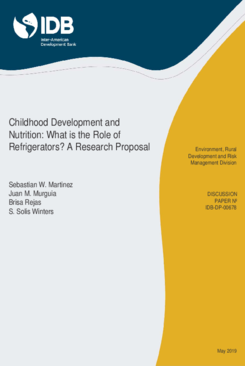Childhood Development and Nutrition: What is the Role of Refrigerators?: A Research Proposal
Date
May 2019
Despite the existence of a vast body of literature in the field of health economics on overweight, obesity, and undernutrition, little is known about the importance of owning a refrigerator on the consumption of healthy foods and balanced nutrition. Refrigerator ownership is limited in the developing world, in countries with average PPP adjusted incomes below US$10,000 per year, only 20% of households own one. This study uses data originally collected for the evaluation of a community nutrition program in El Alto, Bolivia, that has a rich set of socioeconomic, demographic, and nutrition variables. A balanced panel of 1571 households and a balanced panel of 1310 children among these households were created for child-level nutrition analysis. We estimate the effects of household refrigerator ownership on diet and nutrition outcomes using fixed effects models. Results provide evidence supporting the idea that owning a refrigerator increases healthier food consumption and has long-term effects on children’s health.



